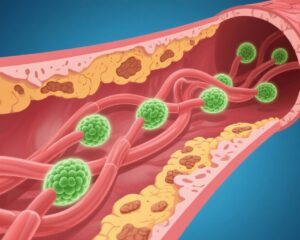Introduction: Understanding Thyroid Health Concerns in Everyday Life
Thyroid issues—ranging from hypothyroidism (underactive thyroid) and hyperthyroidism (overactive thyroid) to thyroid nodules and chronic inflammation—have become common topics of concern in public health discussions. Many individuals encounter terms like “thyroid nodules” during routine health checks and experience anxiety about their implications. This often triggers haphazard dietary changes or unrestricted use of supplements in attempts to manage the condition, sometimes without medical guidance.
Amidst these fears, a simpler and scientifically grounded solution exists: nutrition. Specifically, the vegetables we consume daily can play crucial roles in supporting thyroid health. This article explores the connection between selenium—a trace mineral found in certain vegetables—and thyroid function, highlights common vegetables that aid thyroid health, dispels prevalent misconceptions, and provides practical dietary guidance.
Scientific and Clinical Evidence: The Essential Role of Selenium and Other Nutrients for Thyroid Health
The thyroid gland produces hormones critical for regulating metabolism, growth, and development. Its activities rely on several nutrients, with selenium playing a pivotal role in hormone synthesis, conversion, and regulation. Selenium is a component of selenoproteins, enzymes that protect the thyroid gland from oxidative damage and facilitate the conversion of thyroxine (T4) to the more active triiodothyronine (T3).
Although overt selenium deficiency is rare, subtle insufficiency can quietly impair thyroid function. Research indicates that patients with thyroid diseases—particularly autoimmune conditions like Hashimoto’s thyroiditis—often have lower selenium levels (Ventura et al., 2022). Adequate selenium intake supports immune balance and may reduce inflammatory activity in thyroid autoimmune disorders.
The selenium content in vegetables varies by soil selenium availability. Some regions have selenium-rich soils producing selenium-abundant crops. Tomatoes, for example, accumulate selenium and contain vitamin C, enhancing selenium’s bioavailability.
Besides selenium, the thyroid depends on other nutrients, including iodine, iron, zinc, vitamins A, D, and E, all of which contribute to hormone production, antioxidant defense, and immune regulation.
Common Misconceptions and Harmful Behaviors Regarding Diet and Thyroid Health
Misunderstandings about thyroid nutrition are common and can lead to counterproductive behaviors:
– Fear of Iodine: Some avoid iodized salt and iodine-rich foods (like seaweed) fearing they might worsen thyroid nodules or autoimmune thyroiditis. Yet, iodine is essential for hormone production; exclusion without medical advice may cause deficiency.
– Overconsumption of Iodine-Rich Foods: Excessive intake, particularly of seaweed or kelp, can trigger hyperthyroidism in susceptible individuals.
– Mislabeling Certain Vegetables as Harmful: Cruciferous vegetables like cabbage are sometimes shunned due to concerns that their goitrogenic compounds inhibit thyroid hormone synthesis. However, cooking significantly reduces these compounds, making cooked cabbage safe and beneficial.
– Blind Supplementation: Overuse of “selenium-rich” or “functional” foods and supplements without physician oversight risks toxicity since selenium has a narrow optimal range.
These misconceptions can exacerbate nutritional imbalance and thyroid symptoms, underscoring the need for evidence-based guidance.
Practical Dietary Strategies: Six Vegetables to Support Thyroid Health
Healthcare professionals often recommend incorporating certain vegetables into the diet to provide the necessary micronutrients for thyroid function. These vegetables are nutritious, generally well tolerated, and readily available:
| Vegetable | Key Nutrients for Thyroid | Role in Thyroid Health | Notes on Consumption |
|---|---|---|---|
| Tomatoes | Selenium, Vitamin C | Enhance selenium absorption; antioxidant effects protect thyroid cells | Fresh or cooked; a versatile daily inclusion |
| Cabbage (Cooked) | Vitamin C, Phytochemicals | Supports immune regulation, antioxidant defense, reduces inflammation | Best eaten cooked to reduce goitrogens |
| Carrots | Beta-carotene (Vitamin A precursor) | Facilitates thyroid cell repair and modulates inflammation | Raw or cooked; include regularly for vitamin A support |
| Spinach | Iron, Folate, Magnesium | Supports hormone synthesis and corrects anemia often seen in hypothyroidism | Avoid large amounts raw on empty stomach; best boiled and sautéed |
| Pumpkin | Zinc, Vitamin E | Maintains antioxidant systems, enhances hormone activity | Gentle on the digestive system; ideal in colder seasons |
| Shiitake Mushrooms | Vitamin D precursors | Vitamin D modulates immune response and may lower autoimmune thyroid risk | Good in stir-fries and soups; sun exposure enhances vitamin D activation |
Including these vegetables regularly provides supportive nutrients that complement medical treatments and help stabilize thyroid function.
Expert Recommendations and Insights
Medical experts emphasize the importance of balanced nutrition over radical dietary restrictions or excessive supplementation. Selenium intake should align with national guidelines—approximately 55 micrograms daily for adults—to avoid toxicity (National Institutes of Health, 2022). Markedly, no single food or supplement can cure thyroid disorders; rather, a combination of proper medical management and nutritional support yields the best outcomes.
In addition, experts advocate for comprehensive approaches addressing lifestyle factors like stress management, sleep quality, and regular physical activity, as these collectively influence thyroid health.
Patient Scenario: Sarah’s Journey to Managing Chronic Thyroiditis Through Diet and Lifestyle
Sarah, a 42-year-old woman, was diagnosed with Hashimoto’s thyroiditis after experiencing fatigue and weight gain. Initially overwhelmed, she avoided iodized salt and seaweed altogether, fearing worsening symptoms. She also tried various supplements without medical guidance, which did not improve her condition.
Guided by an endocrinologist, Sarah adopted a nutrient-rich diet incorporating tomatoes, cooked cabbage, carrots, spinach, pumpkin, and shiitake mushrooms. Alongside her prescribed medication, she noticed improvements in energy levels and mood over six months. Sarah’s case illustrates how thoughtful dietary choices complement medical treatments and help maintain thyroid health.
Conclusion: Balanced Nutrition as a Foundation for Thyroid Wellness
Thyroid disorders are prevalent and can subtly impact quality of life through effects on metabolism, mood, and fertility. Nutritional status, particularly selenium and other micronutrients, plays a vital role in thyroid function and immune balance.
Eating a diverse diet rich in certain vegetables—tomatoes, cabbage, carrots, spinach, pumpkin, and shiitake mushrooms—provides essential nutrients that support thyroid health. Avoiding misconceptions and harmful extremes, and following expert advice ensure nutrition complements clinical care effectively.
Ultimately, managing thyroid health is a multifactorial endeavor involving diet, lifestyle, and medical oversight. Embracing simple, evidence-based dietary practices can empower patients and clinicians to improve thyroid outcomes over the long term.
References
- Ventura M, Dalpiaz PLM, Duarte GFS, Pagan LU, Gois MLM. Selenium and Autoimmune Thyroid Disease: An Update. Int J Mol Sci. 2022;23(4):2003. doi:10.3390/ijms23042003.
- National Institutes of Health, Office of Dietary Supplements. Selenium Fact Sheet for Health Professionals. https://ods.od.nih.gov/factsheets/Selenium-HealthProfessional/ (Accessed June 2024).
- Benvenga S, Trimarchi F. Selenium and thyroid autoimmunity: from pathogenesis to treatment. J Endocrinol Invest. 2023 Feb;46(2):299-310. doi: 10.1007/s40618-022-01879-5.
- Zimmermann MB, Boelaert K. Iodine deficiency and thyroid disorders. Lancet Diabetes Endocrinol. 2015 Nov;3(11):286–95. doi:10.1016/S2213-8587(14)70225-6.


